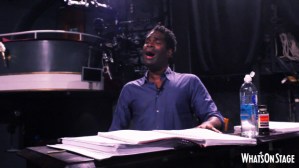Review: Ragtime (Charing Cross Theatre)
Thom Southerland revives Terrence McNally, Lynn Ahrens and Stephen Flaherty’s Tony Award-winning musical
It’s almost twenty years since this toe-tapping, conscience-pricking musical premiered in Toronto, before earning 12 Tony nominations on Broadway. But a all these years on, its music and its messages are just as potent, especially when it gets an outing as good as Thom Southerland‘s revival at Charing Cross Theatre.
Based on EL Doctorow’s 1975 novel, the show follows three groups of Americans at the turn of the 20th century: New York State’s wealthy middle-class, represented by Mother and her family; America’s immigrant population, seen in the figure of Latvian Jew, Tateh, and his daughter; and the African-American community, represented by Harlem musician Coalhouse Walker Jr.
Today’s world may not be exactly as it was in the early 1900s, but a chilling familiarity descends as we witness the racist vitriol (and much more besides) endured by Coalhouse, or watch Tateh brave the oceans for the sake of his daughter, only to end up in dangerously pitiful conditions. And Southerland isn’t about to let us escape this recognition. As the first act closes with "Til We Reach That Day", an incensed protest on America’s injustices, the cast marches down the sides of the audience. Met on all sides by a wall of rousing, rage-filled sound, there is no turning away from the show’s contemporary relevance. It is one of the show’s most deeply affecting moments.
And there are plenty more, not least thanks to the cast’s elegant performances, which blossom under Southerland’s subtle direction. There is mesmerising chemistry between Coalhouse Walker Jr (Ako Mitchell) and his partner Sarah (Jennifer Saayeng), and a winning performance from Anita Louise Combe as the unfalteringly courageous and compassionate Mother. These three also give the night’s best vocal performances, although mention must also be made of Seyi Omooba, making her professional debut as Sarah’s friend with some scorching solos.
The ensemble numbers are when things really fly, however, with the cast making heart-swelling work of Stephen Flaherty’s Tony-award-winning score: an artful concoction of soaring ballads, pulsing ragtime tunes and stirring marches. All of this is achieved without a band; instead, 12 actors play instruments.
Ewan Jones’s choreography is understated but perfectly pitched – in one quietly brilliant moment, the cast freeze, just for a beat or two, in tableaux that perfectly foreshadow the changes about to upend their lives. And, as is often the case at this modestly-sized venue, the set is a multitasking marvel on wheels, morphing from country house to cresting ship with the spin of a wooden ballustrade, and transforming pianos into cars, trolleys and soap boxes as the cast perch on and clamber over them.
After the interval, there is a marginal dip in energy, perhaps a by-product of act two’s darker, more challenging material, but things have stabilised by the show’s finale, which sees the cast daring to dream of a brighter future.
Over a century later, it seems the world is still working towards that dream; this show is a timely reminder to keep working.
Ragtimeruns at the Charing Cross Theatre until 10 December.













